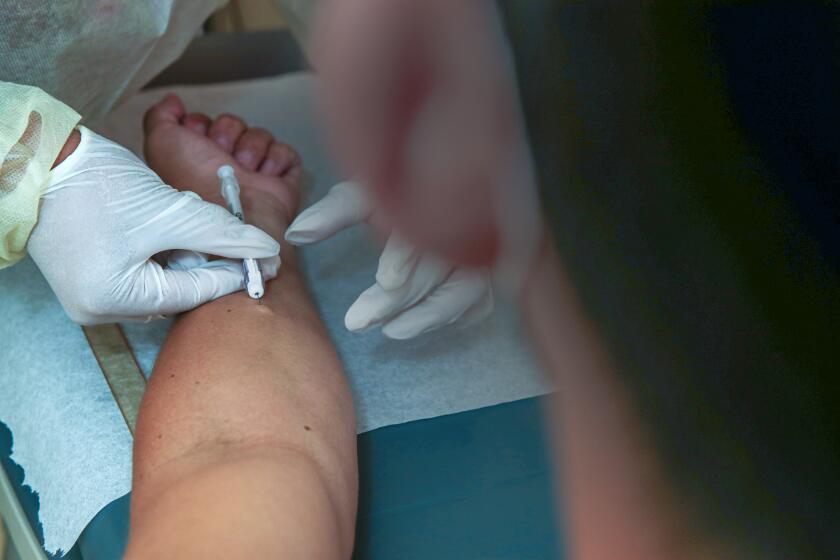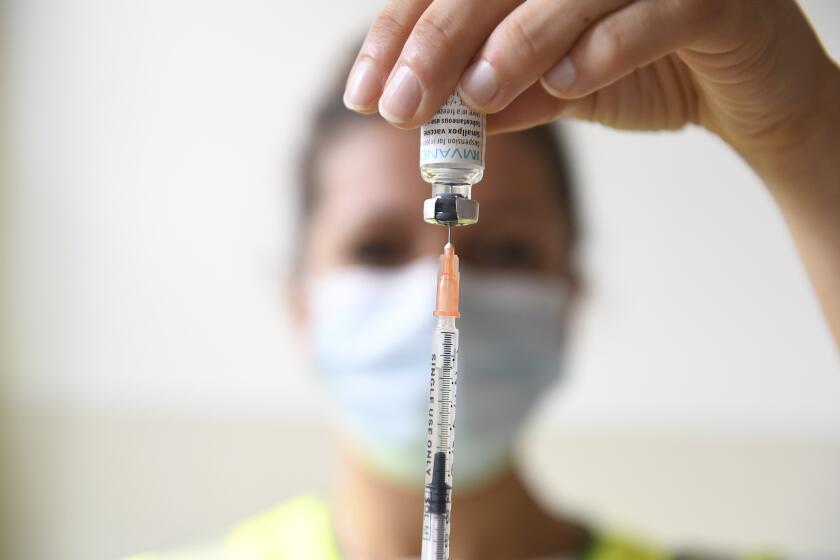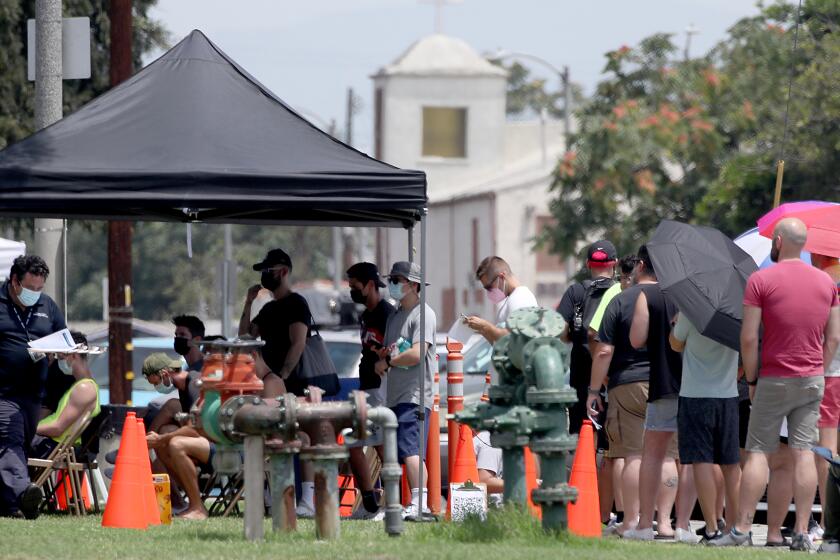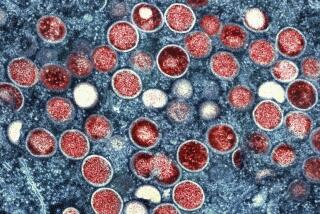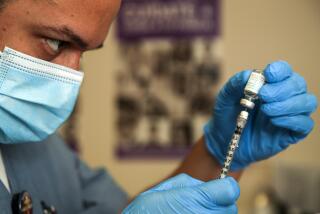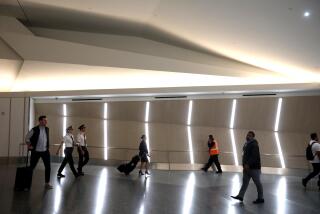More in L.A. County eligible for monkeypox vaccines; California outlines isolation protocols
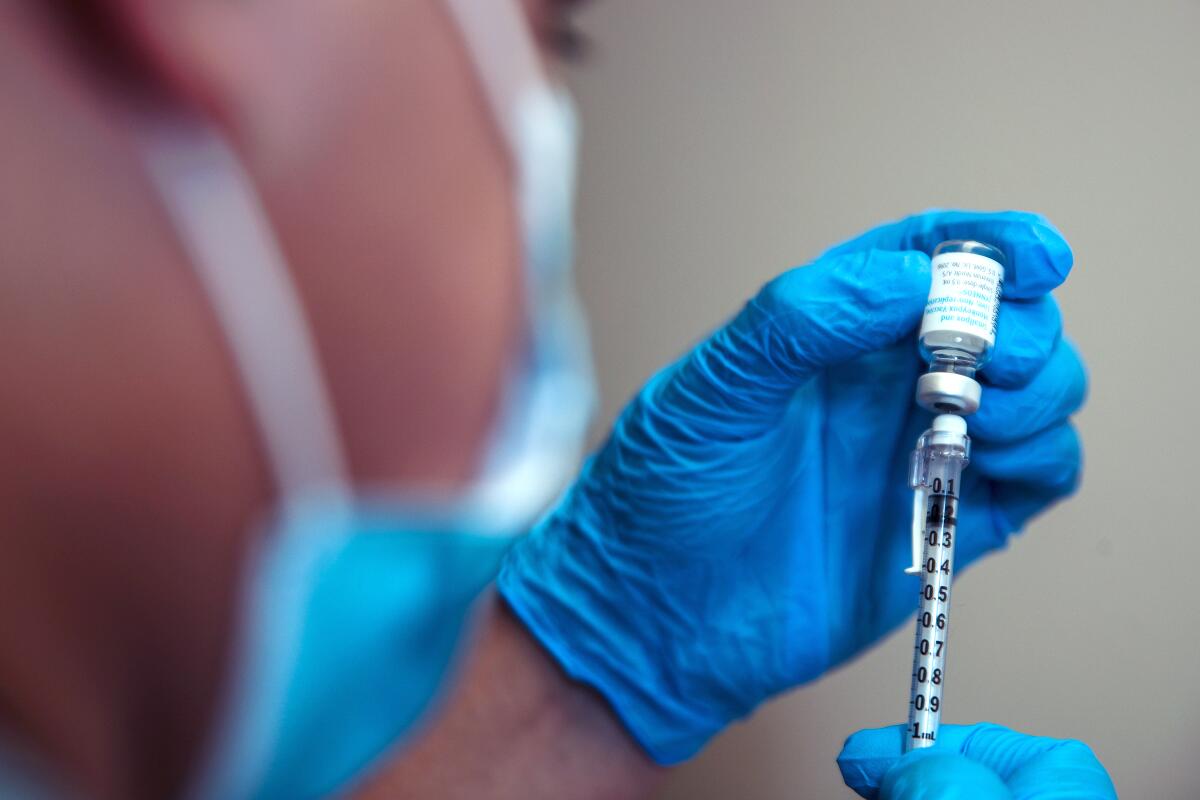
- Share via
Eligibility for monkeypox vaccines in Los Angeles County expanded again this week, increasing access to the two-dose series to more people meeting high-risk criteria, even as vaccine quantities remain limited.
Under the new parameters, the Los Angeles County Public Health Department will continue to primarily target vaccine distribution to gay or bisexual men and transgender people who meet certain health or behavior risk factors, as the majority of confirmed cases in the county during this outbreak have been among LGBTQ men, a trend reflected across California and the globe.
Experts say the virus is spreading most easily through intimate skin-to-skin contact, including sex. However, monkeypox can be transmitted to anyone under the right circumstances, regardless of gender or sexuality.
Cases have continued to rapidly rise in recent weeks, increasing by about 40% in L.A. County and the state in the past week, according to county and state public health department data. In L.A. County, confirmed and suspected cases surpassed 1,200 Monday. Statewide, the total reached 2,660 on Thursday. The vaccine supply remains low, but has slowly increased over the last few months.
Eligibility for the Jynneos shot also was expanded to children at high risk for the virus.
As of Monday, gay or bisexual men and transgender people in L.A. County could receive the Jynneos vaccine if they had skin-to-skin or intimate contact, like kissing or hugging, with someone at a large venue during the last two weeks. And anyone who has engaged in transactional sex in the last two weeks is also newly eligible for the vaccine.
This follows an expansion of eligibility last week after the county received additional doses and federal officials authorized a new method of vaccine administration that can stretch one vial of the vaccine fivefold, which has allowed public health officials to maximize their limited doses. Except for those under 18 or with a history of keloid scars, all monkeypox vaccines in the county will be administered in the new method, which involves a shallower shot, between layers of skin, instead of into underlying fat.
Barbara Ferrer, director of L.A. County’s public health department, said her agency had expected to receive more doses from the federal government last week than were shipped, but acknowledged the new method of distribution has greatly increased its ability to reach those at risk. She said federal officials also indicated additional orders for more doses will soon be fulfilled.
“More doses will be available to communities like ours that have a population that’s at higher risk that we need to reach,” Ferrer said. “We haven’t received enough doses to reach all of them.”
As monkeypox cases across California and the U.S. continue to rise, experts address some of the concerns and questions swirling about virus, and what activities people should consider risky, or not.
The Jynneos vaccine is a two-dose series, with shots administered four weeks apart. It can be used preventively and within two weeks of an exposure.
Anyone who had previously been eligible for the shot in L.A. County, is still eligible, including people who have been identified through contact tracing as being at high risk or those with certain sexually transmitted diseases or on HIV pre-exposure prophylaxis, according to the county health department. People who meet the guidelines need only to self-attest their eligibility and can sign up for a vaccine appointment online or by phone with a local clinic or provider, or contact the health department at (833) 540-0473 from 8 a.m. to 8:30 p.m. for additional assistance.
The state also recently outlined isolation guidelines for those with a confirmed or suspected monkeypox case, recommending people stay at home until infection has been ruled out or their skin lesions are fully healed, with a fresh layer of skin formed and they’ve been free of other symptoms for at least 48 hours.
Federal officials on Tuesday announced that they will stretch limited vaccine supplies by giving one-fifth the current dosage.
The guidance recommends limiting interactions with household members, especially skin-to-skin contact or sharing of towels or personal objects, and advises wearing a tight-fitting mask and covering any lesions when unable to avoid others. The guidance says people can resume limited, lower-risk activities if they’ve been free of fever, respiratory symptoms or new lesions for at least 48 hours and any lesions that can’t be covered — like those on the face — are fully healed. Those patients should bandage or cover any unhealed lesions, wear a well-fitting mask and avoid crowded settings.
Symptoms for monkeypox can last up to four weeks.
Many people are not yet eligible for monkeypox vaccines in L.A. County, but officials said workers in certain occupations can take steps to protect themselves.
“The risk of monkeypox remains low for the general public and that includes workers,” said Dr. Muntu Davis, the county’s health officer. “[But] there are also a number of steps workers can take to generally protect themselves and their clients. ... Our team has identified several sectors as priorities for this guidance.”
Davis said people working in gyms, hotels and other businesses that provide personal care services, like massage or skin care salons, can take additional steps to protect themselves, like staying home when sick, wearing gloves, disinfecting surfaces and washing their hands.
Davis said that as of last week there have been no cases affiliated with these sectors, adding that most people who contract monkeypox recover without treatment.
However, many patients have reported extremely painful lesions, and Davis said at least 26 people have been hospitalized in L.A. County for the illness. No one in the U.S. is known to have died of monkeypox.
Times staff writers Rong-Gong Lin II and Luke Money contributed to this report.
More to Read
Sign up for Essential California
The most important California stories and recommendations in your inbox every morning.
You may occasionally receive promotional content from the Los Angeles Times.
